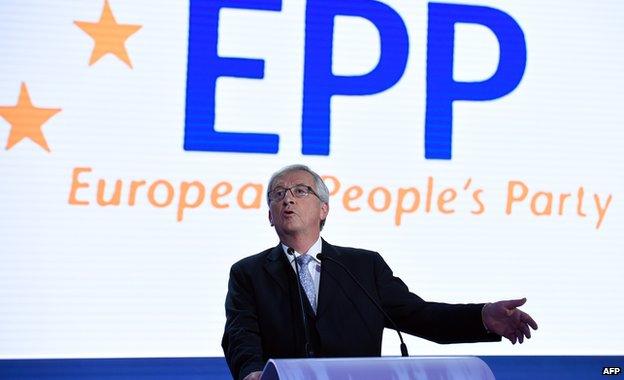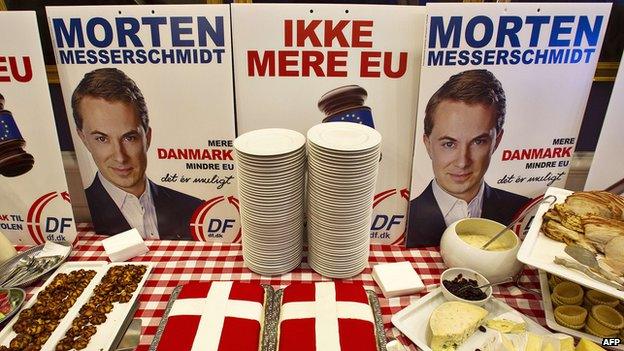EU diplomatic dance around Juncker
- Published

Jean-Claude Juncker's candidacy is proving controversial amid competing visions for the EU
As post-election manoeuvring continues in Brussels, the process of choosing the next President of the European Commission is shaping up to be as protracted and poisonous as widely predicted.
Luxembourg's Jean-Claude Juncker is officially "more confident than ever" that he will get the job, but efforts by his supporters to present victory as a fait accompli have been stopped in their tracks.
EU diplomats close to Mr Juncker admit that some countries are sceptical, but they insist that only one - the UK - is openly opposed to their man.
He could still win, but it won't be easy.
"Nobody can issue diktats," said the Italian Prime Minister Matteo Renzi on Thursday.
The priority should be "to provide answers to the people, not to the ambitions of candidates".
Diplomatic minefield
There are also rumblings of discontent within the Commission itself about Mr Juncker, and other names are inevitably in the frame.
Suggestions that a female candidate should be nominated are gaining ground.
Still, it's very tricky for David Cameron.
If Mr Juncker's campaign succeeds that will be seen as a big defeat for the British prime minister; if it fails, Juncker supporters will blame Mr Cameron and will try to ensure that there is a political price to be paid.
The President of the European Council, Herman Van Rompuy, is in charge of trying to identify the right candidate - next week he will consult political groups in parliament.
They will undoubtedly remind him that any nominee has to win a parliamentary majority, and that many of them strongly support the process from which Mr Juncker emerged as the front-runner.
Merkel wants 'content'
But it's all about finding the right balance, and the role of Chancellor Angela Merkel will be as crucial as ever.
Her public support for Mr Juncker has been carefully phrased.
"We must not forget that this is also about content," she told a news conference after the G7 summit.
"It is important to put together a package."
Several leaders have said they want to set out more precisely what they believe the Commission should be doing over the next five years, before they decide who should lead it.
But Ms Merkel too is in a very difficult position: under huge pressure from parts of the German political establishment and the German media to ensure Mr Juncker does get the job, but also anxious not to do anything that could be seen to push the UK closer to the EU exit.
EU leaders were due to agree on a name at a summit at the end of this month, but that deadline could now slip.
It is unlikely that a formal vote on a nominee will take place at the EU summit - and a complex search for consensus may have to continue through the summer.

"No more EU": The Danish People's Party is set to team up with the UK Conservatives
Shifting alliances
There has also been plenty of manoeuvring within the European Parliament this week about the composition of political groups. Forming a group gives you more funding, more speaking time and more positions of influence.
The news that the Eurosceptic European Conservatives and Reformers (ECR) group, to which the British Tories belong, had accepted applications from the nationalist Danish People's Party and The Finns raised some eyebrows.
Both parties had previously been in the same group as UKIP, and both of them include MEPs with past convictions for inciting racial hatred.
A decision on whether to accept the application of the anti-euro German party Alternative fuer Deutschland (AfD) has been delayed.
David Cameron isn't keen on the idea because now is not the time for his party to do anything that might offend Angela Merkel. But even if all Tory MEPs agreed with him (which they don't), the rest of the group is likely to vote in favour of the AfD anyway.
The situation is still fluid, but it could be enough to make the ECR the third-largest group in parliament, overtaking both the Liberals (ALDE) and the Greens.
UKIP meanwhile is now struggling to put together a strong group (you need at least 25 MEPs from seven countries) - squeezed between the ECR on one side and a new right-wing nationalist group led by Marine Le Pen of the French National Front on the other.